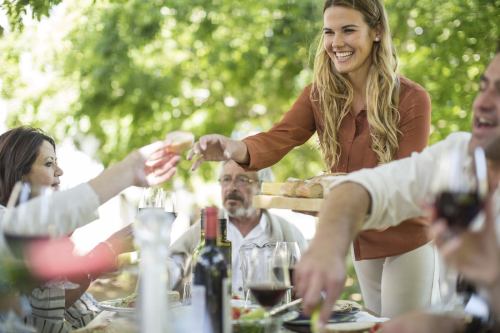Why you should cultivate a habit of thanking your food before you eat it
Gratitude practices are part of many wellness experts' morning routines—here's the argument for making your gratitude list before you chow down.

Gratitude practices are the new to-do lists—all sorts of successful people, from the CEO of Barry’s Bootcamp to Cate Blanchett, count giving thanks as part of their daily routines. It’s a smart move on their part, since grateful people have been found to be happier, healthier, and more resilient than those who instead focus on what’s going wrong in their lives. But for those of us whose mornings and evenings are already packed with workout classes, meal prep, and complex skin-care regimens, the thought of adding yet another task to the lineup can feel way more intimidating than inspiring.
Luckily the digital age has turned us all into expert multitaskers, presenting a genius solution: We can layer gratitude practices on top of activities we’re already doing each day. And in my opinion, one of the best times to tune into the goodness that surrounds us is during meal times. Of course, giving thanks over food isn’t exactly a groundbreaking concept—it’s a staple practice in cultures and religions around the world. But even if you didn’t grow up saying grace, there’s still a lot to be said for acknowledging your good fortune before you chow down.
I mean, think about all the less life-affirming things you do while you’re eating. Maybe you’re listening to a podcast while scrolling through astrology memes. Maybe you’re catching up on your emails. Maybe you’re filming your quinoa bowl with that zoom filter that plays a slow-jam riff in the background. We’re a society of inattentive eaters. This may seem harmless on the surface, but it can make us more likely to engage in unwanted behaviors around food. Research shows that distracted dining can lead to overeating, an increase in snacking after the meal, and even impaired memory about what was on the plate.
But when you pause before your first bite to think of a few things you’re grateful for, your attention naturally turns to what’s in front of you—let’s say it’s guacamole hummus. You’re overcome with appreciation that we live in a world where such a magnificent thing exists. You send a mental high-five to the farmers who picked the perfectly ripe avocados that went into the recipe, and to your boss who pays you enough to spend obscene amounts of money on said avocados. A few minutes go by, and you realize you haven’t looked at your phone once because you’re marveling over the flavor of your snack. Essentially, you’re practicing a form of mindfulness meditation without even realizing it. Sounds a lot nicer than getting FOMO from some influencer’s Portofino vacation pics, doesn’t it?
There are practical benefits to mealtime gratitude practices, as well. “Taking the time to have a mindful moment before you eat your meal can help with your digestion as well as your fullness cues,” says holistic health coach Molly Alliman, creator of the Intuitive Eating Nutrition Plan. “Appreciating what is on your plate—the colors and smells, as well as the texture and taste when you take your first bite—allows you to slow down so you chew every bite and are able to stop when you are full.”
Thanking food also has an undeniable impact on mood—how can you not smile when you’re silently giving props to your nachos?—which may help people make food choices that better serve them. A recent study published in the Journal of Experimental Social Psychology found that a group of students who expressed gratitude once a week for a month saw their eating habits become healthier while their negative feelings declined, not just for the duration of the study, but for three months after it ended. In my experience, however, gratitude has helped me make peace with so-called “unhealthy” foods and actually learn to enjoy them in a balanced way. Like many wellness professionals who are constantly bombarded with fear-mongery nutrition information, I’ve dealt with anxiety around certain ingredients—particularly around the time when experts started demonizing gluten, dairy, and sugar in a big way. After a few unhappy years of totally denying myself the foods I once loved in an attempt to follow a “clean” diet, I realized the stress I was causing myself at mealtimes was a lot worse for my health than eating the occasional pizza. Now when I’m at a dinner with friends, I focus on how lucky I am to be with them in that moment, leaving no room to feel anything but fantastic about the non-organic wine or chocolate cake in front of me.
And speaking of eating with friends, why not share your gratitude list with your brunch and dinner dates? Studies show that expressing gratitude in a romantic relationship increases feelings of connection and satisfaction, and the same undoubtedly goes for friendships and family. Gas up your work wife on your next Sweetgreen run. Ask every member of your girl gang to share the highlight of her day while you wait for your apps to arrive. Tell your partner how much you appreciate them giving you the last of the cauliflower gnocchi. The important thing is to be consistent—there’s no item on your list that’s too insignificant and no moment that isn’t right for a hit of gratitude. Even if you’re just having cereal for dinner in front of the TV.
Here’s everything you need to know about intuitive eating:
Need some A-list inspiration? Here’s how Mandy Moore practices gratitude around her dinner table. And if gratitude lists aren’t your thing, consider making a failure résumé instead.
Sign Up for Our Daily Newsletter
Get all the latest in wellness, trends, food, fitness, beauty, and more delivered right to your inbox.
Got it, you've been added to our email list.










